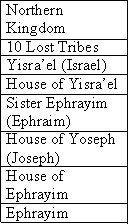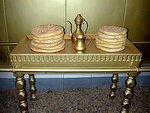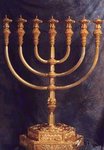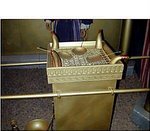So if He has a personal Name, why would we continue to call Him by a title? Is the word “God” a title or a name? This “title”, “God”, has been known as His name for many years. But if it isn’t His Name, then whose name is it?
 We can find the answer from Leah, one of Jacob’s wives. Let’s look at Genesis 39:11 in 3 versions of Scripture, Hebrew, King James with the numbers from Strong’s Concordance, and Institute for Scripture Research.
We can find the answer from Leah, one of Jacob’s wives. Let’s look at Genesis 39:11 in 3 versions of Scripture, Hebrew, King James with the numbers from Strong’s Concordance, and Institute for Scripture Research.Gen 30:11 ותאמר לאה בגד ותקרא את־שׁמו גד׃ (Hebrew)
Gen 30:11 And Leah3812 said,559 A troop cometh:1413 and she called7121 (853) his name8034 Gad.1410 (KJV)
Gen 30:11 And Le’ah said, “With Gad_!” So she called his name Gad_. (ISR)
What exactly was Leah saying? Did she say “a troop cometh”? Or did she say “with Gad”? Looking at the Hebrew and using Strong’s concordance let’s see what we can find. Strong uses the number 1413 and 1410 when quoting and describing what Leah said. Let’s see the definition for these numbers based on Strong’s. Strong’s lists the number, then the Hebrew letters, then the pronunciation, and then his definition. So first let’s look at H1413 and then H1410.
H1413 גּדד ga^dad , gaw-dad'
A primitive root (compare H1461); to crowd; also to gash (as if by pressing into): - assemble (selves by troops), gather (selves together, self in troops), cut selves.
H1410 גּד ga^d, gawd
From H1464; Gad, a son of Jacob, including his tribe and its territory; also a prophet: - Gad.
1. The first thing to notice is that the Hebrew letters are not the same for the two words.
2. Secondly, we notice the pronunciation of the name, gawd or god.
3. Thirdly we should notice that the number 1410 is not a definition of the word but it describes who this person was.
So where is the definition of the word? What does the word mean?
Why are there two different numbers for what she said? Is it really saying “god”?
Now I use Strong’s rather frequently when trying to see what is said in Scripture, but I have found that Mr. Strong was human. Occasionally he makes a mistake. Let’s look at the Hebrew letters above in the verse from Gen. 30:11. For those who can’t really read Hebrew we will just have to look for two groups of letters that look similar.
 Here are the two groups of letters for what Leah said about her son. Now notice something very interesting. Remember Hebrew is read from right to left. So the first group of letters are Dalet-Gimmel dg and the second group of letters are different they are Dalet-Gimmel-Bet dgb. In 1413, the first set of Hebrew letters that Strong uses, he uses letters that are different than what is written in the Hebrew. He uses Dalet-Dalet-Gimmel- ddg גּדד . This is not what it says in the original Hebrew, therefore the number he assigns to the first group of letters cannot be 1413, so the definition “troop” would be incorrect. So what number should be assigned?
Here are the two groups of letters for what Leah said about her son. Now notice something very interesting. Remember Hebrew is read from right to left. So the first group of letters are Dalet-Gimmel dg and the second group of letters are different they are Dalet-Gimmel-Bet dgb. In 1413, the first set of Hebrew letters that Strong uses, he uses letters that are different than what is written in the Hebrew. He uses Dalet-Dalet-Gimmel- ddg גּדד . This is not what it says in the original Hebrew, therefore the number he assigns to the first group of letters cannot be 1413, so the definition “troop” would be incorrect. So what number should be assigned?
Let’s look at the second group of letters. The number assigned is 1410, which as I’ve stated is not a definition, but describing who the person became. So what is the definition, or meaning of the word? Let’s look at Strong’s number 1408 and even 1409.
H1408 גּד gad, gad
A variation of H1409; Fortune, a Babylonian deity:
H1409 גּד ga^d, gawd
From H1464 (in the sense of distributing); fortune:
The Hebrew letters are written the same as what was written in our verse above. Why did Mr. Strong not use 1408 or 1409 instead of 1410 or 1413? You can ponder that for a moment.
Now let’s look at Isaiah 65:11
Isa 65:11 But ye859 are they that forsake5800 the LORD,3068 that forget7913 (853) my holy6944 mountain,2022 that prepare6186 a table7979 for that troop,1408 and that furnish4390 the drink offering4469 unto that number.4507 (KJV)
Isa 65:11 "But as for you who forsake the LORD and forget my holy mountain, who spread a table for Fortune and fill bowls of mixed wine for Destiny, (NIV)
Isa 65:11 “But you are those who forsake יהוה, who forget My set-apart mountain, who prepare a table for Gad, and who fill a drink offering for Meni. (ISR)
In the KJV it states that they prepare a table for that “troop” and yet Strong gives it the number 1408. The NIV uses the word “Fortune” based on the 1408 number. Then ISR takes it a step further and uses the Hebrew word or name of Gad. It is clear that the Isaiah 65 verse is talking about the name of a pagan deity named Gad as well as the deity Meni who was the deity of destiny. Isaiah was not talking about a troop or a number. It doesn’t even make sense reading the context of the verse.
Therefore based on the Hebrew letters and the definition of the words, Mr. Strong should have used his number 1408 for the name of Leah’s son instead of 1410. So if Gad in Isaiah 65 is the same as Gad, Leah’s son, just what was she really saying? What Leah was saying was that the deity of Fortune,Remember Jacob’s wives were not necessarily followers or believers of Yahweh as their Elohim or as the only Elohim. Rachel, Leah’s sister, took the idols from their father Laben’s house before they left. Leah and Rachel were no strangers to pagan deities and would not blink an eye to naming their children after one of them.
definition of the words, Mr. Strong should have used his number 1408 for the name of Leah’s son instead of 1410. So if Gad in Isaiah 65 is the same as Gad, Leah’s son, just what was she really saying? What Leah was saying was that the deity of Fortune,Remember Jacob’s wives were not necessarily followers or believers of Yahweh as their Elohim or as the only Elohim. Rachel, Leah’s sister, took the idols from their father Laben’s house before they left. Leah and Rachel were no strangers to pagan deities and would not blink an eye to naming their children after one of them.
Gen 31:19 And when Laban had gone to shear his sheep, Raḥel stole the house idols that were her father’s.
Gen 31:34 Now Raḥel had taken the house idols and put them in the camel’s saddle, and sat on them. And Laban searched all about the tent but did not find them.
Gad “God” was and is the name of the mighty one of fortune. We know that as believers in Yahweh we should not be seeking the mighty one of fortune but that Yahweh is our treasure and He will supply our needs. It’s kind of ironic isn’t it that our money states, “In God we trust” Is it in Yahweh we trust or in Fortune?
Apart from Gad, the son of Jacob, Yaacob, there was another “Gad.” The astrologers of Babel called Jupiter (Zeus) by the name “Gad.” He was also well known among the Canaanites (the Kenaanites) where his name was often coupled with Baal, Baal Gad, which according to the Massoretic vowel pointing in the Book of Yehoshua is pronounced: Baal God, or Lord God. This same name is discovered in the ancient Germanic languages as Gott, Goda, Gode, God, Gud, Gade. And searching further back into its Indo-Germanic (Indo-European) roots, we find that it traces back to the word GHODH, which means “union,” even “sexual union”.
I do not call Yahweh my Father, “God” because that is how the name of the pagan deity Gad’s name is pronounced. So if I say God help me, it is the same as saying Gad help me, in pronunciation. I find it better to use the Name of the One True Elohim, the Name He gave us to call Him, Yahweh. I find no reason to give Him a substitute name or title. So I hope that answers the question as to why I use Elohim. Inevitably, someone will say, “Well, I don’t speak Hebrew”. To which I answer, “Do you speak Greek? Babylonian? German? French? Then why use their words but balk at using Hebrew?” If you have ever uttered the word Halleluyah or Immanuel then you are speaking Hebrew. So using another Hebrew word isn’t such a stretch. I realize that habits are hard to break, but consider the following verse:
Exo 23:13 “And in all that I have said to you take heed. And make no mention of the name of other mighty ones, let it not be heard from your mouth.
On this road we travel to walk as righteously as we can, doing what we can to please our Father and Savior, I encourage you to pray about it and see what He speaks to your heart concerning what His Name is and what is pleasing to Him. This choice is yours for the making, I’m only answering the question why I don’t use it. This is between you and Yahweh. Yahweh Bless you!















